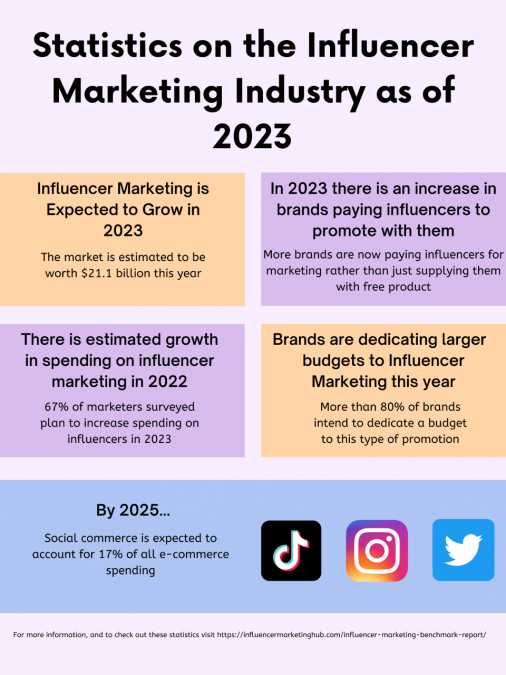Commoditizing an influence
Commoditizing an influence
Pick your favorite social media influencer. One that you have followed for a while, keep up with their content regularly, like their photos on Instagram or watch their YouTube videos. Can you answer questions about their personality, what beauty products they like, maybe even what their favorite food is?
You have most likely followed this person for a while, and you probably have an idea of their posting schedule so you can keep up to date with their latest videos and pictures. You have definitely had an opinion on one or more of their relationships, and maybe even get protective if someone dislikes them.
At some point, this influencer might have done something you didn’t like, and maybe you went to the comments section of their page to express your frustration with them. You probably felt annoyed, almost like you two were fighting. But then they posted an apology video, and promised to never do what they did again. The influencer probably gushed about how much they love their followers and how sorry they were that they made you all feel negatively about them. You felt appreciated and needed. And, though it probably took a few days, you went back to watching their videos with nothing but love and admiration for their content and towards them.
You have never met this person, and you most likely never will. Yet, you feel like you know them like a friend.

If this is true for you, you are the majority of social media users. This one-way friendship people create in their mind with their favorite influencers is not new, and it affects the business of being an influencer.
When YouTube launched in 2005, social media influence became a career. Today, there are currently 50 million people worldwide who consider themselves to be content creators. Influencing became a business with the implementation of influencer marketing, and now companies all over the world are dedicating money to use social media personalities as advertising tools. According to a survey, 75% of brands are creating budgets in 2022 for their products to be marketed by influencers on social media. So, in 2023 social media influence is more than just a side hobby, and you as a follower mean more to influencers than just a community they reach out to. Usually, you and your loyalty to a content creator is the difference between them making or not making a salary.
Brendon Ferguson has made a career working in the business of social media relationships. Ferguson, born and raised in California, is the founder of a boutique influencer management and marketing company, Lost Files Media LLC. The company is based in Los Angeles and New York City. They exclusively represent six influencers who range in numbers of followers from hundreds of thousands to millions.All of Ferguson’s influencers work with different brands and promote products in their videos. He says that brand deals come with the growth of a following. Content creators grow audiences because followers feel like they are a part of the influencer’s life through their constant posting.
The friendship feeling followers create with the influencers he manages usually comes from the content they share about their private lives. Ferguson encourages his clients to make their followers feel included in their lives and to give them access to the behind-the-scenes reality of the influencer, but only to an extent. All this content and access to information about these influencers can allow followers to feel like they know everything about them, including how they should and shouldn’t act, he says.
“If you feel like you’re part of someone’s life, you feel like you have a say in their life,” Ferguson says.
Back in July, a Reddit page was created by followers of one of Ferguson’s clients. A fan of his client found a video of her from the past, where she was speaking differently than she did in current videos. He explained that this led some of her followers to criticize her current persona for being different than it was before TikTok fame.
The comments on this page attacked the influencer’s personality. One comment even says they used to like her, but now she has a “bad ass attitude,” describing her as “cocky.” These comments went farther than just the Reddit page, with some followers even leaving comments on her paid promotional posts with brands.
Ferguson says because of this Reddit page, his client lost brand partnerships she had signed, and the potential commission that came with them.
Accessibility has always been a part of social media, and it is partially the reason that so many of us enjoy it. During the COVID-19 pandemic lockdowns, when seeing other people regularly was no longer a part of our daily lives, access into the lives of celebrities and influencers became even more important to the average follower, according to Bradley J. Bond.
Bond, an associate professor of communications at the University of San Diego, says during the pandemic people built friend-like connections to social media influencers to compensate for their lack of in-person relationships. People downloaded social media apps more than ever before because of boredom indoors, and influencers posted more frequently about their lives at home.
Influencers felt more authentic when they were stuck in their homes. They were dealing with the same pandemic as the rest of the world, Bond says, making followers feel even more connected to them than they might have before.
But as many of us know, authenticity and social media never really go hand-in-hand. Most people who gain a large following on any social media platform are playing what Aaron Dinin considers a character.
Dinin, a professor at Duke University, teaches a class on how to build your brand and market yourself on social media. To be considered to enroll in his course, you already have to be a content creator, and be willing to continue to post on a regular basis.
He says that influencers are a character of themselves, one that maybe started out as authentic, but eventually they probably grew out of that person. It’s the difference between you as a ten-year-old and you now – you probably have similar characteristics to who you were then, but your likes and dislikes have grown and matured as you have gotten older. Dinin says that this creates a divide between who followers think an influencer is and who they really are.
Along with his career as a professor, Dinin is also a creator on social media with 21.4k followers on TikTok (@aarondinin), posting content on the side of the app known as “teacher-tok”. He posts regular videos of himself and his students in the classroom, giving his followers an inside look into his Duke courses. The videos include everything from funny teacher anecdotes about ways to get his students to keep coming to class, to videos of him grading papers using viral sounds on the app.
@aarondinin A+ for the flattery effort. C- for execution. #student #dukestudent #professor #professorsoftiktok #teacher #teachersoftiktok #teachertok #teacherhumor ♬ DM Pretty – This Boy Be In My DM say I’m Pretty / Live OffBeat Session – Tank And The Bangas
From the outside, it looks like Dinin offers his followers a full transparent look into his personality and his career as a teacher. But Dinin, like any other influencer, is only showing the character of himself he chooses: the teacher.
Though Dinin doesn’t promote other brands on his social media, he is an unofficial social media promoter of Duke University. Whether he means to or not, his content influences the opinion of people who consider coming to Duke.
Dinin has always worried about his job as an influencer affecting his teaching career, especially after he was close to being fired because of his TikTok content.
He says he remembers receiving an email invite to a meeting with his department dean. In this meeting, the dean let Dinin know that the school received an email from a student at a different university. This student claimed Dinin was purposefully failing all of his students. Dinin’s dean told him that the email insinuated they needed to fire him from his job at Duke.
When Dinin was informed that this tip came to the school because of his TikTok content, he was surprised, and immediately wondered what he had posted that could be interpreted so wrong by a follower.
Though he was not fired, and still continues to teach at the university, this is a jarring memory for Dinin. It was a moment in time when he realized his content and his followers could affect more than just his social media presence.
“My daughter has a very serious health condition, and the medical center [at Duke University] has saved her life, and continues to treat her,” Dinin said. “I get health insurance, and I need the health insurance for the safety of my child. Had [this student] actually gotten me fired, she could have potentially caused my child to die. Because of her random interpretation of a piece of content.”
Social media influencing is a cat-and-mouse game, as Dinin explains it. The more followers you get, the more enticing you are to brands or companies looking to promote themselves on your pages. But, with a bigger audience comes more people with opinions, and more chances to get negative feedback from people thinking they know you. This more negative feedback scares brands away from using certain influencers, but Dinin argues negative feedback means you are growing as a content creator, and that it isn’t always a bad thing.
Ferguson agrees with Dinin, but he also explains a dilemma that comes with this mindset. He says brands won’t work with influencers because of personal negative attacks from followers, whether or not followers have evidence to back up their claims. Ferguson says, influencers are there to promote the brand, not themselves, so the brand reserves the right to back out if they deem it necessary.
Though this fact is debatable among people in the industry, the power of other people’s opinions of an influencer affecting their ability to make money is intimidating to most. Selah Victor is a mom-influencer with two toddler-aged boys. She uses her platform on TikTok (@selahvictor), where she has 271.2K followers, to promote mostly mommy-and-me brands such as beach wagons for kids, or a child-care center that she loves. Most of her paid posts include her kids in them because, she says, it’s part of the deal with the brand.
“Mom-influencers” have grown in popularity on social media pages, with one of the more well-known influencers in this category being Maia Knight (@maiaknight). Knight has 8.8 million followers on her TikTok page, but she also has multiple Reddit pages that criticize her social media for including her children, some people even writing that they know she is a “negligent” mother because of her content.
The feedback that influencers like Knight receive, even though she has a massive following and a multitude of brand deals, makes smaller influencers like Victor think more about the content she posts. Victor worries that posting content with her kids can give the world too much access to them, and open her family up to criticism from followers. She says it’s a hard thing to navigate, because she equates social media to a family business. Paid promotional posts are how she makes money for her kids, and yet the idea of giving the world too much access to her children is frightening.
“That’s been tricky for me. I felt conflicted about it,” Victor says.
Another way many influencers deal with this question of access is to continue to give followers as much access as they feel comfortable with, Ferguson says. Many influencers open themselves up to the public in hopes of giving them enough information about themselves, so that followers can’t interpret content the wrong way and cannot create these false claims about the personality of an influencer that could get back to a brand.
They want their followers to feel like friends so that feedback is positive and brands feel comfortable working with the influencer.
Influencers are people, Ferguson says. He believes it is important for followers to recognize their significance over an influencer’s life and career, and to understand that their words, or Reddit pages, have an impact.
“At the end of the day, an influencer’s thing that separates them from just having a following is that they make money and that’s their brand, that’s their business. But, you know, these are still regular people,” Ferguson says, “who have families and who need to support themselves and need to pay bills.”












